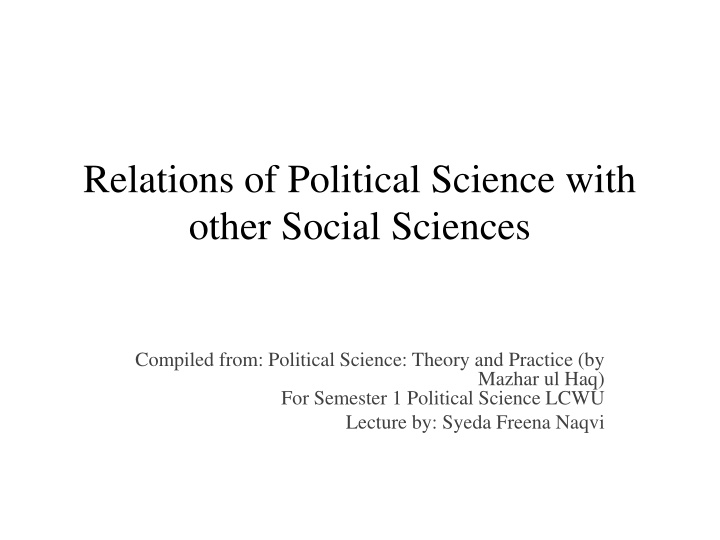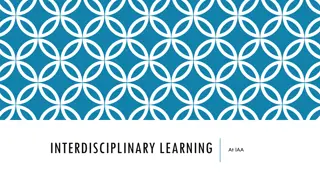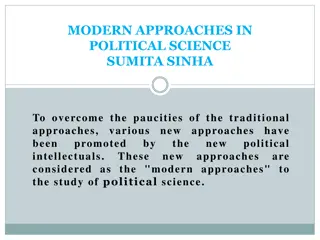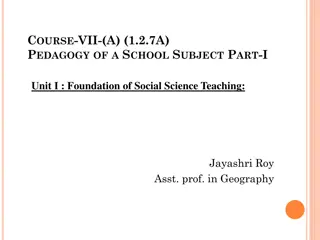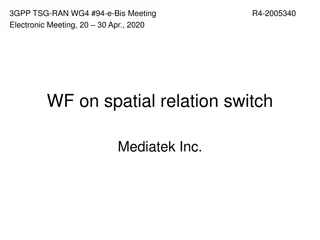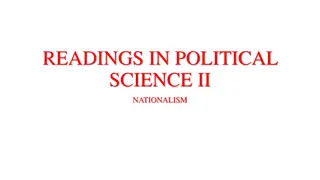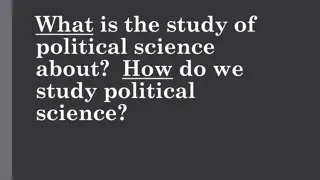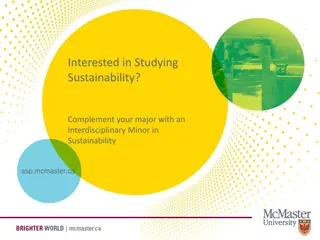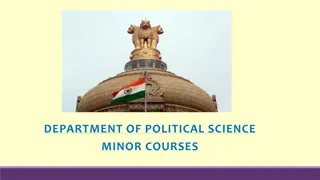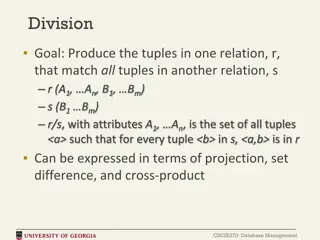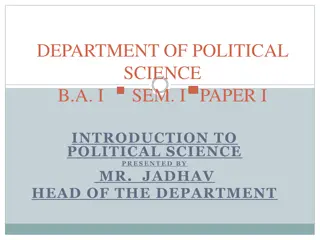Interdisciplinary Approach in Political Science and Its Relation with History
The need for an interdisciplinary approach in political science emerged in the 20th century to study political issues from various social science perspectives. This approach emphasizes the interrelation between political science and other disciplines like history. History provides the foundation for political science by offering insights into past events and their impact on political institutions. Conversely, political science offers guiding principles for evaluating historical events. Together, they enhance our understanding of political phenomena and societal evolution.
Download Presentation

Please find below an Image/Link to download the presentation.
The content on the website is provided AS IS for your information and personal use only. It may not be sold, licensed, or shared on other websites without obtaining consent from the author.If you encounter any issues during the download, it is possible that the publisher has removed the file from their server.
You are allowed to download the files provided on this website for personal or commercial use, subject to the condition that they are used lawfully. All files are the property of their respective owners.
The content on the website is provided AS IS for your information and personal use only. It may not be sold, licensed, or shared on other websites without obtaining consent from the author.
E N D
Presentation Transcript
Relations of Political Science with other Social Sciences Compiled from: Political Science: Theory and Practice (by Mazhar ul Haq) For Semester 1 Political Science LCWU Lecture by: Syeda Freena Naqvi
The Need for Inter-disciplinary Approach: In twentieth century that the need was felt for a more comprehensive inter- disciplinary approach to the study of politics (Darwin s discovery of evolution, sociology and psychology ) Reasons Man is a thing of nature and a social and political being. The sciences which study man, his life, society and state, must need be interrelated. Any political problems have various aspects, which can be properly understood only if we also study them from the viewpoints of the concerned social sciences (loosely called political , such as poverty, crime or unemployment). A political scientist may be able to provide advice on some of the institutional forms which remedial action might take, and also upon the political difficulties standing in the way of that action; but his own special knowledge does not enable him to say how unemployment, crime, and poverty might be done away with. J.D.B. Miller
POLITICAL SCIENCE AND HISTORY History without Political Science has no fruit, Political Science without History has no root. Sir John Seelcy History It is a record of past events and movements, their causes and relations. Tells the origin and development of the state and other political institutions. it furnishes the materials which form the basis of Political Science German philosopher, Schopenhauer, history has been the fact-gatherer for political Science, as also for other social sciences. It has been a storehouse of facts and events, from which many political theorists and scientists have derived theories and laws of Political Science. The obverse of this relation is equally true Political Science furnishes such guiding principles and laws of development and evolution on the basis of which historical events and movements can be properly evaluated and understood.
E.g. history of one hundred years of Indo-Pakistan before Independence will not tell us much unless we also know that these events were occurring under the influence of the political principles of nationalism and freedom struggle against British Imperialism Their differences subject-matter Only a part of History is Politics, that which is called political history. Political Science concerns with the part of history that has direct bearing on the study of the state and political institution E.g. World war 2 H: the causes, events and effects of the World War II P: a struggle between dictatorship and democracy, the purpose for which it was fought. Politics is also concerned in the shape of the state which arose as a result of the wars common denominator is political history, or the history of political struggles and institutions
Method H: mainly narrative and analytic: matter of fact things and casual relationship, It needs not speculate what ideal institutions might have been P: selects and analyses them and finds out principles and laws in them. It is speculative and philosophical, as it deals with what the State ought to be History is not the only source of Political Science you may have a political theory which is a good theory without being rooted in historical study Barker But a complete break isn t helpful. The reason is that political theory is ultimately intended for political action, which must take place in historical setting and context (otherwise Utopian and visionary; not a political thought concerned with the state and practical politics) Political Science Not much to do with Past History Science of past Teleological because it considers the ends of state and laws Not Teleological (doesn t look at ultimate ends)
POLITICAL SCIENCE AND SOCIOLOGY is like the relation of a part to the whole, of a branch to the trunk Sociology is the general science of society. It studies the nature, origin and development of society in all its aspects; the individual and the social groups, whether organized or-unorganized, conscious or unconscious, economic, religious, political, or intellectual. Political Science also studies society but only politically organized society, called the state. It studies social acts and ideas but only of political nature. Political Science Sociology deals with him as a citizen or subject of the state with only one kind of associations (the political system or the state) deals with man as a socius deals with all kinds of associations;
What is political is also social, though what is social is not necessarily political. Both sciences are mutually contributory. Political Science gives to Sociology facts about the organization and functions of the state, and obtains from it knowledge of the social basis of the state, law and political authority Giddings says, a student of Political Science must begin his subject with a study of Sociology, because to teach the theory of the state to men who have not learned the first principles of Sociology is like teaching astronomy or thermodynamics to men who have not learned the Newtonian laws of motion Differences The scope of Political Science is narrower than that of Sociology. Sociology is prior to Political Science, because society was prior to the state i) ii)
iii) Political Science assumes that man is a political animal, but Sociology explains how and why he became so and how his political life is affected by his membership in other forms of associations iv) Sociology, like history, studies actual social organizations and associations, but Political Science aims at a study of the past, present, and future of the political institutions and states.
POLITICAL SCIENCE AND ECONOMICS Adam Smith, the father of classical economics, says in his famous book, The Wealth of Nations, that it deals with two objects: to provide sufficient revenue or substance for the people, (ii) to supply the state with a revenue sufficient for public service. Political Economy, he said, proposes to enrich the people and the sovereign. Modern economists, however, believe that Economics is a separate science, which meets Political Science at certain points, but it is an independent science in its own rights. Dr. Marshall defines it as the Study of man in the ordinary business of life. It inquires how he gets his income and how he spends it. Thus it is on the one side a study of wealth and, on the other, and more important, a part of the study of man . Economics, therefore, is the study of human welfare and includes discussion on consumption, production, exchange and distribution, the four departments of this science. (i)
1. Economics and political peace and order. both of them study man and strive to foster and promote his well-being economic activities of man are possible only when the state has created favorable conditions 2. Promotion of economic well-being, prosperity and progress Classic economists believed that the state should be nothing more than a police state. This was what the laissez faire economists demanded of the state in the past. But this view led to great social misery and poverty Nowadays, every state seeks to promote the economic well-being of the individual and general welfare and prosperity of the nation and country. the state devises price control and rationing system, regulates working hours, conditions of labor, etc Modern state is becoming a welfare state. In socialist and communist countries, the state used to undertake far more economic activities
3. Economic exchange, banking and consumption and Politics Modern state has to interfere in all phases of economic activity State coins money and issues currency notes to supplement it and makes them legal tender. inflation, circulation of money, industrialization of the country, to increase agricultural production and must regulate banking to facilitate credit 4. Economic distribution and Politics how national wealth is distributed among various agencies of production, e.g., among the workers, the industrialists, the landlords, the bankers or financiers, etc. The capitalist mode of distribution causes inequality of wealth among the various classes which is a very great source of social and political discontent It Causes political troubles, struggles and revolution. It is the main cause of the rise of the politico-economic philosophies of socialism and also of the rise of the socialist or communist States, like the Soviet Union, Communist China, etc.
Economic determinism Karl Marx, the founder of scientific socialism, propounded the theory of economic determinism of history and politics. He declared that economic conditions of a society determine its social and political structure economic and political conditions act and react upon each other
POLITICAL SCIENCE AND ETHICS Ethics is the science of the moral conduct of the individual in society. It deals with the right and wrong of man s conduct and behavior There are two aspects of morality, private and public. State must regulate private morality indirectly and public morality directly. E.g. prohibits drinking, gambling, obscene literature, herion etc. There is, however, a limit to the state interference in the morals of the people Morality is concerned with the inner thoughts and conscience; beyond the power of the state and law to control Law and state can regulate only the external behavior of man Political Science and Ethics in different ages The ancient Greek Philosophers, like Plato and Aristotle, believed that Politics was nothing but the continuation of Ethics to public affairs. Aristotle said that the state came into being to make life possible, but it continues to exist to make it good.
The state exists to promote the social and moral good of man. It is an organization for the moral perfection of man. The Greeks believed that the moral side of the state was more important than its economic and other aspects Machiavelli and Hobbes. They advocate a divorce between Ethics and Politics, between morality and polity. Machiavelli advises a ruler to be ready to do immoral acts in order to protect his state, i.e., his throne. He says, A prudent ruler ought not to keep faith when by so doing it would be against his interest, and when the reason which made him bind himself no longer exists . Modern writers assert that politics without morality is tyranny. Prof. Ivor Brown says: Politics is but ethics writ large. Ethical theory is incomplete without political theory, because man has to live in association with other men; political theory is idle without ethical theory, because its study and its results depend fundamentally on our scheme of moral values, our conceptions of right and wrong . Lord Acton said that the question is not what the state does, but what it ought to do. Every question of politics has to be judged on its moral basis and import. Hence politics cannot be separated from ethics.
POLITICAL SCIENCE & ANTHROPOLOGY Anthropology is the science of ancient societies as well as of the folk societies of the present times. It also studies kinship relations in modern societies. It is that branch of social sciences which studies early man in his relationship with his physical environment, race, and culture. It is generally divided into four branches: (1) Anthropological Geography which deals with the relationship and effect of environment upon man (2) Physical Anthropology which deals with the problem of race , i.e., the meanings of race, different races of Man, their origins and characteristics; (3) Cultural Anthropology which deals with problem of culture , i.e., what is culture, its origins, various types, and the relationship of man with the culture (4) Ethnology and ethnography, which deal with the results of the above three branches. It compares peoples and races of Man and their effectiveness in survival. Thus, Anthropology is defined as the theory of human survival, taking human history as a whole .
Contribution of Anthropology to Political science problem of race given rise to a political theory, called racialism, which has become a political dogma in certain racialist States, like Nazi Germany in the past and in South Africa. The effects of racialism are found also in the theories of nationalism, in color prejudices, in Political attitudes and beliefs, as Herrenvolk or Master Race which are the basis of Nazism in the past, of in Zionism in the present-day Israel, in the Apartheid policy of South Africa, in Anti-Semitism, and in anti-Negro riots in U.S.A. etc. Casteism and tribalism e.g. in India and Pakistan, are anthropological problems of political nature Anthropology deeply affects political thought E.g. conflicts of cultures, cultural, religious and linguistic minorities and their persecution or repression and genocidism are political problems whose solution can be greatly aided by the study of Anthropology
POLITICAL SCIENCE & JURISPRUDENCE Jurisprudence is the study of law. Political Science relation with the science of law is based upon the fact that the state, which is the subject-matter of Political Science, exists mainly for the purpose of making and enforcing law. In fact, social life of an advanced type cannot be possible without law, and law cannot be made and enforced without the legislative, administrative and judicial machinery of the state. The interdependence of the allied sciences of law and politics is shown by the fact that the kinds and contents of laws are determined by the nature of the state. In a feudal state, feudal system of laws and jurisprudence, in a capitalist state, a capitalist system of laws and jurisprudence, and in a socialist state a socialist system of laws and jurisprudence. Their relationship is so close that jurisprudence is really a branch of Political Science. The French writers include both of them in a single science, which they designate as Political Sciences. However, jurisprudence is a vast and separate science and is treated as an independent discipline, though closely allied to Political Science.
POLITICAL SCIENCE AND GEOGRAPHY There is an old belief in geographical determinism of man s social and political life. Many early and modern writers have emphasized the influence of geography on political life, policy and structure of the state. They believe that climate, soil, topography, and other geographical conditions directly or indirectly determine the type of government, policy and national character of a people. Aristotle believed that geography guided political wisdom. Ibn Khaldun also emphasized the effects of geographical environment on politics and history. Bodin was the first modern thinker to dwell upon the relationship between politics and geography. Montesquieu, another French thinker, emphasised the influence of geographical condition on the forms of government and liberty of the people.
An English historian, Buckle, in his book, History of Civilization, he declared that man s mind is a product of his external environment or geography, that is, of such facts of physical environment as food, climate, soil, and the general aspects of nature. In recent times, also, many writers have emphasized the influence of geography on the politics of a country, such as Bluntschli, Treitschke, Huntington and other. The German writers have invented a new term to show this relationship, geopolitik , that is, the determination of the politics of a country by its geography. There is a measure of relationship between and influence of geography on the politics of every country. But it is neither so direct nor so unchangeable It is quite true that the state and political institutions of a country are influenced by its geography, because they occur or grow up in geographical settings. Political geography is an important field of study by both political scientists and geographers.
This relationship between man and his milieu It can be explained both ways, i.e., man influencing milieu or nature, and milieu influencing man. Man, as a geographic agent has refashioned the landscape or the physical features of nature. This influence increases manifold when viewed from the standpoint of the state. It is the basis of power politics. The more a state increases in (i) population, (ii) area, (iii) industry, and (iv) science and technology, the more it tends to expand geographically and to influence, dominate or conquer other lands, countries and nations. e.g. India This tendency has created states and kingdoms and empires in the past and present ages. Even a small country with favorable geographical situation can also play the game of power politics, the insular position and its long coastline made England a naval power, whose politics and government were greatly influenced by its nearness and dependence on the sea politics is a drama played on the stage of geography
In modern times, the influence of geography on politics and state systems has further increased by the development of the nuclear warfare potential, on the one side, and of the space technology, on the other. In not very distant future, these two developments, combined into Star Wars , as the Americans call them, would deeply influence the politics of the whole world in one way or the other. In other words, astronomy, coupled with geography, would determine mankind s future for good or evil. If sanity in internal and international policies of the countries did not prevail, these developments would even imperil Earth s survival as a place of human inhabitation.
POLITICS AND PSYCHOLOGY Graham Wallas was the political writer in England who first laid stress on the need to study psychological factors in political activities, like voting, in his book, Human Nature in Politics, written in 1908. Bentley in the United States also did so at about the same time. Since then many political scientists have also said that political phenomena cannot be explained without explaining their psychological causes and motivations. According to Barker, the application of the psychological clue to the riddles of human activity has indeed become the fashion of the day. If our fathers thought biologically, we think psychologically, Bagehot in his writings pointed out the relation between psychology and the English Constitution. Boutmy has explained the effect of the psychological factors on the character and working of the English and American political institutions. Barker remarked that in the present day, political theorists have turned social psychologists. Lord Bryce in his Modern Democracies (1921) said, Politics has its roots in Psychology. The emphasis on close dependence of Politics on Psychology has given rise to the behavioral revolution in the U.S.A., soon after the Second World War.
For instance, a democracy is a government of public opinion and propaganda, public opinion and propaganda are psychological phenomena. Methods of psychology are applied by governments in the army, intelligence, civil service examinations, in public opinion and elections and in the courts. Lord Bryce has rightly remarked that Politics has its roots in psychology, the study of the mental habits and volitional proclivities of mankind, In spite of the utility of Psychology for Politics, there are certain limitations of the psychological method. Psychology deals with mind and thoughts, as they are and not with what they ought to be, as Politics does. the psychologist does not concern himself with the moral aspect and ends of the political life. psychology has nothing to do with progress and dynamic processes, but Political Science cannot ignore these factors in the state and human mind. psycho-analysis; They explain external matters by too much of subjective analysis. a. b. c.
